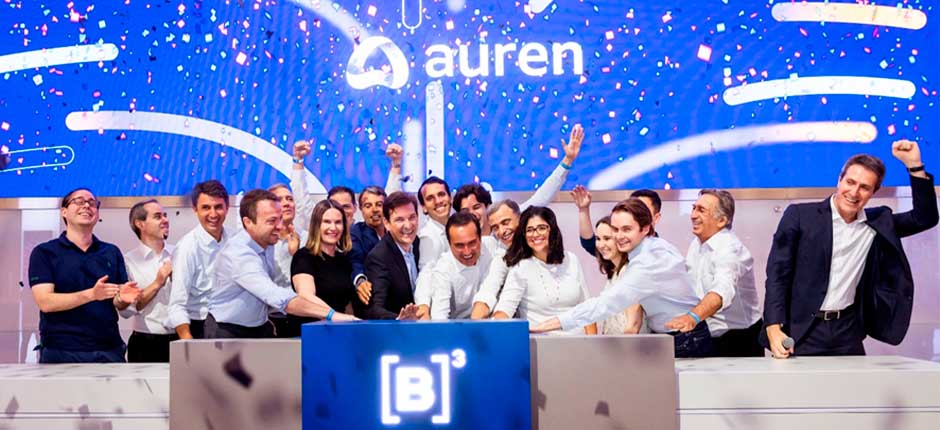Auren Energia, a power generation company created from assets of Votorantim and CPP Investments, debuted in Novo Mercado, the strictest governance segment of the Brazilian exchange B3, valued at R$16 billion. Auren plans to expand and be among the leaders of the industry and says it is ready for acquisitions of renewable assets, a segment defined as its business focus.
Among the operations is Companhia de Energia do Estado de São Paulo (CESP), which became a subsidiary of Auren and accounts for a relevant share of the company’s generation portfolio.
With pro-forma net operating income of R$6.5 billion last year – including Votorantim Energia, VTRM (wind power assets) and CESP – the power company closed its first day on the B3 up 1.91%, encouraging investors who bet on the strategy.
The portfolio has 3.3 GW of capacity, with some ongoing projects expected to start operating this year, and the company is flush of cash. There is about R$1.5 billion to be invested in new projects. The company’s goal is to reach 5.2 GW by 2026, reducing the exposure to hydro sources, which today accounts for more than 70% of the pipeline.
CEO Fabio Zanfelice told Valor he intends to grow in renewable energies and in the free energy market. He also said that the new company was created to invest in assets in the electric sector.
Besides being capitalized and net debt-to-EBITDA ratio of 1.5 times, the company says it is able to take debts for mergers and acquisitions. However, in the current context of escalating interest rates and high capital costs, the company is likely to go shopping with its own capital.
In the market there is a menu of power generation companies for sale, such as the assets of Eletrobras – and the state-owned company itself, which may be privatized – , Ibitu, Rio Energy, Renova and EDP plants. “We are prepared to make any acquisition of any size in the sector today,” said Mr. Zanfelice, without elaborating. “We are capitalized, we have financial and technical capacity to make acquisitions and we will continue to evaluate assets, besides organic growth.”
One way is through solar generation, with ongoing projects that will add 1.7 GW. According to the company’s goal, the source will account for 34% of a 5.2 GW portfolio in four years.
Auren has two solar projects to develop in Brazil, but the challenge in reaching this goal lies in the pressure from the production chains. Last year, the cost of solar panels rose about 8% driven by the cost of freight, the surge in commodity prices and exchange rate volatility, which may cause some generation companies to revise investments.
“We have time to observe the evolution of prices and we consider that the prices of solar panels were impacted by the pandemic, production factors in China, and logistics, but within our strategy we have time to acquire equipment. But if this scenario of equipment costs persists, both solar and wind, sooner or later we will see an increase in the price of power in the long term,” he said.
In wind power generation, Auren currently operates farms in Piauí that have an installed generating capacity of 600 MW. Another 400 MW are expected to start operating by the end of the year. CESP’s generation capacity, with emphasis on the Porto Primavera plant, is 1,624 MW, of a total of 2.3 GW of hydro sources in operation and 160 MW (small plants) under development. The company is also setting up a 68 MW hybrid complex (wind and solar) in Piauí, alongside its assets.
In the commercialization activity, the company’s executives believe that the current business has conditions to be much bolder. The company has 2.6 average GW of power commercialized and about 500 clients.
With the modernization of the electric sector, through bill 414/2021 (currently making its way in Congress), in which one pillar is the growth of the free market, the strategy for this segment goes from power management for new smaller clients, digitalization of commercialization, and even low power clients.
“The expectation is that we will have smaller customers with a slightly higher margin on those products they will demand. Our goal is to increase twofold the number of customers and reach 1,000 customers in a year’s time,” he said.
In the restructuring and incorporation of assets for the formation of Auren, the controlling shareholders are Votorantim S.A., with 37.7%, and CPP Investments, with 32.1%. The remainder (30.2%) are held by minority shareholders in CESP who migrated to the new company, now robust and with a diversified portfolio of assets.
Source: Valor International
https://valorinternational.globo.com


/i.s3.glbimg.com/v1/AUTH_37554604729d4b2f9f3eb9ad8a691345/internal_photos/bs/2022/T/G/R3foBYRXeAdLM2ovDYwA/30emp-200-next-b2-img01.jpg)
